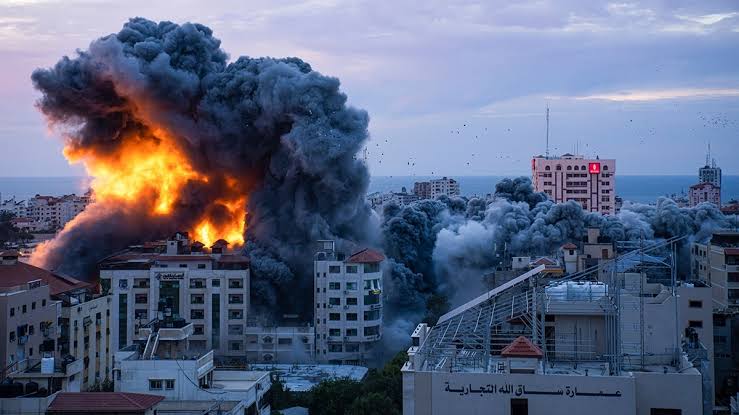The ongoing conflict between Israel and Hamas, the Islamist group governing the Gaza Strip, has escalated to alarming levels of violence and devastation. Commencing on Saturday, October 7, 2023, this war has claimed over 900 lives from both sides and inflicted extensive destruction and suffering. Here, we delve into the critical facts and questions surrounding this crisis.
What triggered the war?
The war was ignited by a surprise assault orchestrated by Hamas and its ally, Islamic Jihad. They launched thousands of rockets from Gaza into Israel and infiltrated the border with armed militants, resulting in civilian and soldier casualties. This audacious attack, marked by its scale and coordination, caught Israel off guard. Hamas asserted that its actions were in response to Israel’s “aggression” and “occupation” of Palestinian territories, expressing a desire to “liberate” Jerusalem from Israeli control.
How Did Israel Respond?
Israel declared a state of war and initiated an extensive aerial and ground campaign to halt rocket attacks and eliminate militants on its soil. Prime Minister Benjamin Netanyahu vowed to exact a “heavy price” from Hamas, reducing its hideouts to “rubble.” Israel also cut off electricity and fuel supplies to Gaza, which could soon exacerbate the crisis as medical facilities struggle to cope with casualties. Israel has hinted at a possible ground invasion of Gaza, a move fraught with considerable risks for both sides.
What Is the Humanitarian Situation?
Gaza faces a dire humanitarian crisis, with densely populated areas under siege from Israeli airstrikes and artillery barrages. The Palestinian health ministry reports over 370 deaths in Gaza, including 20 children, and nearly 2,000 wounded. Numerous buildings, including residential towers, media offices, government buildings, mosques, and schools, have sustained damage or destruction. The UN warns of an impending humanitarian catastrophe, with Gaza grappling with shortages of food, water, medicine, and fuel. The UN urgently calls for a ceasefire and unhindered access for humanitarian relief.
Israel, too, grapples with tension, as millions of Israelis live under the constant threat of rocket fire from Gaza. Israeli media reports suggest that between 500 and 600 Israelis have perished due to rocket attacks or infiltrations. Citizens have sought refuge in safe rooms or bomb shelters, as sirens wail to signal incoming strikes. The rockets have disrupted daily life, transportation, commerce, and education across Israel.
What Is the International Response?
The international community expresses deep concern and alarm over the escalating violence and civilian casualties on both sides. Many nations call for an immediate cessation of hostilities and a peaceful resolution to the conflict. The United States, Israel’s primary ally, reaffirms its support for Israel’s right to self-defense while urging restraint and de-escalation. The US diplomatically engages regional partners to facilitate a ceasefire. The UN Security Council conducts multiple emergency meetings on the crisis but fails to issue a joint statement due to member disagreements.
Several nations take active measures to intervene in the conflict. Egypt, which shares a border with Gaza and has mediated prior ceasefires, dispatches a delegation to both sides in an attempt to broker a truce. Turkey, Qatar, and Iran, all with close ties to Hamas, offer their assistance in ending the violence. Iran’s supreme leader Ayatollah Ali Khamenei commends Hamas for its “brave resistance” and calls upon Muslim nations to support the Palestinian cause.
What Are the Potential Outcomes?
A swift conclusion to the war between Israel and Hamas appears unlikely, as both sides remain resolute in their determination to fight until their demands are met. Hamas insists on continuing rocket fire until Israel lifts its Gaza blockade and ceases its “aggression” against Palestinians in Jerusalem and elsewhere. Israel maintains that its military operation will persist until security is restored and Hamas deterred.
However, neither party can secure a decisive victory in this conflict, given the constraints and challenges they face regarding capabilities and strategies. Hamas lacks the means to defeat Israel either militarily or politically, as it is significantly outnumbered and outgunned by the IDF. Israel cannot entirely dismantle Hamas or prevent its rearmament and reconstruction in Gaza. Both sides also grapple with domestic and international pressure to end the violence and avert further escalation.
Therefore, the most probable scenario is that the war will eventually culminate in a ceasefire agreement that reinstates the status quo ante bellum (the situation before the war). This outcome, while halting immediate hostilities, would leave both sides discontented and frustrated. It would also merely postpone another cycle of violence in the future, without addressing the underlying issues fueling the conflict.



